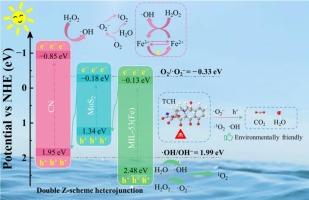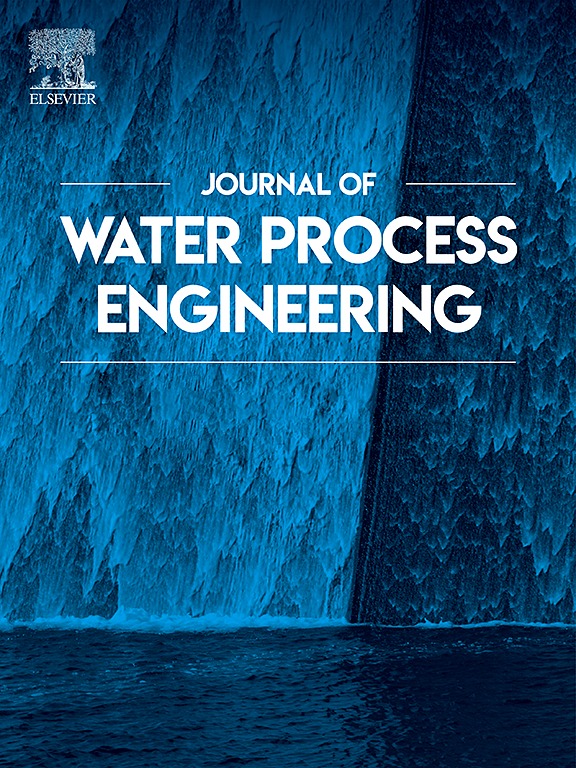Synergistic removal of tetracycline hydrochloride by g-C3N4/MoS2/MIL-53(Fe) photocatalysts with Fenton reaction: Photothermal effect and mechanistic analysis
IF 6.3
2区 工程技术
Q1 ENGINEERING, CHEMICAL
引用次数: 0
Abstract
The combination of photocatalysis and Fenton technology is considered a promising technology for antibiotic wastewater treatment. In this paper, a CN/MoS2/MIL-53(Fe) double Z-scheme heterojunction catalyst with a photothermal effect was constructed. The intrinsic photothermal conversion effect of the catalyst was conducive to increasing the photo-Fenton catalytic activity. Meanwhile, the double Z-scheme heterojunction inhibits the recombination of photogenerated carriers, which improves the redox capacity. It is worth mentioning that the photo-Fenton system can remove 92.5 % of TCH in 30 min, which is 1.64 and 1.32 times higher than that of the photocatalytic and Fenton reactions, respectively, and its excellent performance was caused by the superior Fe3+/Fe2+ cycling efficiency, as well as the synergistic effect between photocatalytic and Fenton reactions. The experimental results indicated that the photo-Fenton system demonstrated strong resistance to ionic interference and structural stability, confirming its potential for practical applications. Free radical trapping experiments revealed the key roles of active species such as ![]() O2−, h+, 1O2, and
O2−, h+, 1O2, and ![]() OH in the removal of tetracycline hydrochloride (TCH). The possible degradation intermediates and pathways of TCH were deduced by LC-MS analysis. In addition, the toxicity analysis showed that the constructed photo-Fenton system was an environmentally friendly technique for antibiotic wastewater treatment.
OH in the removal of tetracycline hydrochloride (TCH). The possible degradation intermediates and pathways of TCH were deduced by LC-MS analysis. In addition, the toxicity analysis showed that the constructed photo-Fenton system was an environmentally friendly technique for antibiotic wastewater treatment.

g-C3N4/MoS2/MIL-53(Fe) 光催化剂与 Fenton 反应协同去除盐酸四环素:光热效应和机理分析
光催化与 Fenton 技术的结合被认为是一种很有前景的抗生素废水处理技术。本文构建了一种具有光热效应的 CN/MoS2/MIL-53(Fe) 双 Z 型异质结催化剂。催化剂固有的光热转换效应有利于提高光 Fenton 催化活性。同时,双 Z 型异质结抑制了光生载流子的重组,提高了氧化还原能力。值得一提的是,光-芬顿体系能在 30 分钟内去除 92.5 % 的 TCH,分别是光催化和 Fenton 反应的 1.64 倍和 1.32 倍,其优异的性能得益于卓越的 Fe3+/Fe2+ 循环效率,以及光催化和 Fenton 反应的协同效应。实验结果表明,该光-芬顿体系具有很强的抗离子干扰能力和结构稳定性,证实了其实际应用的潜力。自由基捕获实验揭示了 O2-、h+、1O2 和 OH 等活性物种在去除盐酸四环素(TCH)过程中的关键作用。通过 LC-MS 分析,推断出了 TCH 可能的降解中间体和途径。此外,毒性分析表明,所构建的光-芬顿系统是一种环境友好型抗生素废水处理技术。
本文章由计算机程序翻译,如有差异,请以英文原文为准。
求助全文
约1分钟内获得全文
求助全文
来源期刊

Journal of water process engineering
Biochemistry, Genetics and Molecular Biology-Biotechnology
CiteScore
10.70
自引率
8.60%
发文量
846
审稿时长
24 days
期刊介绍:
The Journal of Water Process Engineering aims to publish refereed, high-quality research papers with significant novelty and impact in all areas of the engineering of water and wastewater processing . Papers on advanced and novel treatment processes and technologies are particularly welcome. The Journal considers papers in areas such as nanotechnology and biotechnology applications in water, novel oxidation and separation processes, membrane processes (except those for desalination) , catalytic processes for the removal of water contaminants, sustainable processes, water reuse and recycling, water use and wastewater minimization, integrated/hybrid technology, process modeling of water treatment and novel treatment processes. Submissions on the subject of adsorbents, including standard measurements of adsorption kinetics and equilibrium will only be considered if there is a genuine case for novelty and contribution, for example highly novel, sustainable adsorbents and their use: papers on activated carbon-type materials derived from natural matter, or surfactant-modified clays and related minerals, would not fulfil this criterion. The Journal particularly welcomes contributions involving environmentally, economically and socially sustainable technology for water treatment, including those which are energy-efficient, with minimal or no chemical consumption, and capable of water recycling and reuse that minimizes the direct disposal of wastewater to the aquatic environment. Papers that describe novel ideas for solving issues related to water quality and availability are also welcome, as are those that show the transfer of techniques from other disciplines. The Journal will consider papers dealing with processes for various water matrices including drinking water (except desalination), domestic, urban and industrial wastewaters, in addition to their residues. It is expected that the journal will be of particular relevance to chemical and process engineers working in the field. The Journal welcomes Full Text papers, Short Communications, State-of-the-Art Reviews and Letters to Editors and Case Studies
 求助内容:
求助内容: 应助结果提醒方式:
应助结果提醒方式:


